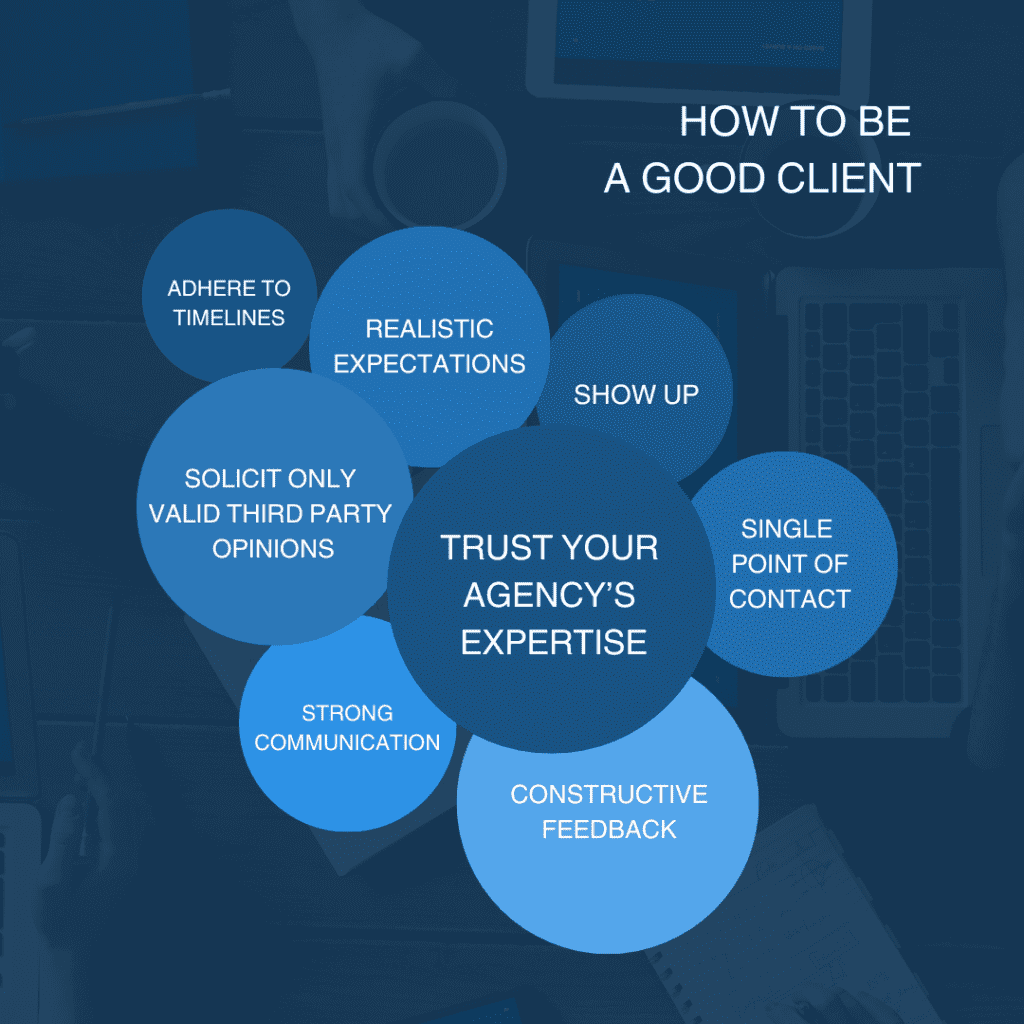
The Good Client
Grace Crawford
Project Manager

1. Set Realistic Expectations. You need to help determine an initial budget and timeline with your agency, and both should be realistic. Ask your agency how long something will take, and understand that it may take some time. You should always allow your agency to take the time they need to complete the work. A good agency will work hard to get the job done well, and a good client will trust that.
2. Strong Communication. Thorough and clear communication is key not only for an agency but also for a client. When providing feedback, it is important to keep your thoughts consolidated and convey them articulately. Communicating conflicting ideas or piecemeal will only cause confusion down the road. Poor communication often results in delays in a project or, even worse, a project not being executed properly.
3. Single Point of Contact. If you have other key stakeholders who need to approve the project, it’s important to ensure that all feedback is consolidated before going back to the agency. Establish a single point of contact on your end to ensure your agency does not hear conflicting messages from numerous people. Make sure all key stakeholders come to an agreement in advance instead of relying on the agency to referee your internal strifes. Tracking the final direction is challenging, and things could easily fall through the cracks. Additionally, it’s important to loop in stakeholders at the proper time. Do not wait until the end of the project lifecycle to get their buy-in.
4. Constructive Feedback. Always give honest feedback; however, do it in a manner that is constructive. Avoid being vague and resist the urge to say unhelpful things like, “I’ll see it when I see it.” It can be difficult to put thoughts into words, especially when something isn’t right, but try sitting with it for a bit before communicating with your agency. Waiting to put your thoughts on paper also helps keep everything consolidated.
5. Adhere to Timelines. If you hold your agency to deadlines to get your project done, you will also need to hold yourself accountable. If your agency asks you to review something within a specific time frame, it is important for you to hold up your end of the deal. Should your agency fail to give you a deadline, proactively ask them when they need your feedback in order to keep things moving. Sometimes it’s inevitable to be late with reviewing; however, do not expect your agency to cut their time in half in an effort to make up for lost time with your delays.
6. Solicit Only Valid Third Party Opinions. Sometimes it’s hard to make decisions, and therefore, it’s tempting to get feedback from third parties you trust. Avoid going to those who haven’t been looped in on your project from the start and don’t have the history on it. It could only cause more confusion and result in you questioning things that have already been thoroughly validated by you and your agency.
7. Show Up. If you’re invited to meetings to review the progress of your project–simply put, show up. If you’re asked questions, be sure to answer them. Coordinate your key stakeholders to show up at the appropriate times, too. Showing up to meetings further ensures that everyone is on the same page and ultimately helps keep your project on track.
8. Trust Your Agency’s Expertise. Most importantly, you partnered with your agency for a reason, and good clients respect the people they hired to do the job. Remember that your agency has the special knowledge to help you plan and execute a project. A healthy agency/client relationship thrives on a strong partnership. Should your agency explain that your requests may not be aligned with your brand or may result in poor execution, listen to them. Always hear them out and understand it comes from a place of thorough understanding–not only of your brand and business–but the industry as a whole.
Interested in additional tips about client and team relationships? Check out these blog posts, also written by Project Manager Grace Crawford:





